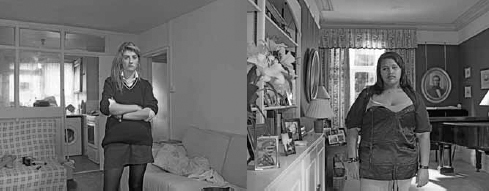12
Worlds apart: how inequality breeds fear and prejudice in Britain
A new documentary lays bare how inequality breeds fear and prejudice in Britain through the eyes of two very different teenage girls (the ‘Cutting Edge’ documentary, ‘Rich Kid, Poor Kid’, was broadcast the day after this article was published, on Channel 4 at 9pm on November 13). […]
Britain has changed. A generation ago, our children knew more about each other. They were more likely to go to the same school if they lived on the same street, and they were more likely to know of the lives of others around them, even where there was great difference between their families’ incomes.
Today, children in Britain live in more fear and ignorance of each other. The well-off are ferried around by car, told not to walk down the wrong street – and, if they do walk, told that other children are dangerous and not to be mixed with. Poorer children are told they are worth less in comparison with others. They are labelled as failures in a country where we avidly count academic qualifications. Poor children are told that they are poor due to the fault, failure and the lack of “responsibility” of their parent(s).
These changes and the impact they have on individual lives are explored in tomorrow night’s Channel 4 ‘Cutting Edge’ documentary, ‘Rich Kid, Poor Kid’, as it follows two teenagers in London from different ends of the social scale meeting for the first time.
Alice, 15, lives in a six-bed townhouse. She says she lives in an oasis of safety surrounded by “dangerous” areas that are not “upper-middle class” like her enclave. Her only connection with the children who live in the council flats nearby is that “they nick our bikes … apart from that, we never had any reason to connect with them at all”.
Alice doesn’t think of herself as rich. You have to have many millions to be rich, she says. Her mother, Fiona, doesn’t like where she lives. She says it’s too near to the scary estates where “people get murdered, where people aren’t British. You don’t see any white people round here, they are all blacks. I don’t think you should say that … but it’s true.”
At the opposite end of the same street lives 17-year-old Natalie, in a two-bed council flat with her mother and brother. The family lives on £165 a week. Natalie, who left school at 15, is the one who phones up the council to try to find a school place for her five-year-old brother, who missed out on getting a place in reception. She’s the one in charge of her family. Her mother gets depressed and can’t cope, and her brother sleeps on the floor, although his family bought him a bed and assembled it while filming. It takes all Natalie’s determination to get him a place in a school.

Note: the girls pictured in each other’s homes
Photograph: Phil Fisk
Loan shark
Natalie’s mother is finding living hard enough itself, but she knows what matters. She knows the point when you realise that you can never have a childhood birthday again. When her mother borrows £100 to pay for Natalie’s birthday, she does so at a 55% interest rate from a loan shark.
Alice’s father works in finance; Natalie’s father died when she was six. Although these two girls live within a stone’s throw of each other, they live at the social extremes of life in Britain.
However, for the purposes of the C4 programme, they get to meet. But first they are to be shown photographs of each other. “She’ll be a chav,” Alice predicts. And Alice will be “white and she has blond hair and she wears a lot of foundation”, Natalie says. When they eventually meet, they look, they stare, they talk, and they listen. Natalie explains how her family ended up on benefits. They hug.
“I made a comment about how people who don’t work don’t deserve to have benefits,” Alice says. “I have to kind of take in that other people have issues … She thinks we’re posh. I’ve been brought up on fear, haven’t I?”
When they meet again, Natalie suggests they “can go round the estate or through the estate”. Alice has never been through. “This is my block; it’s a shithole, but I like it,” explains Natalie. They visit each other’s homes. They compare holidays – Butlins and skiing. Alice’s mum apologises for how small her garden is; Alice explains that their piano is “only” a baby grand. Natalie doesn’t appear to feel out of place in Alice’s home. Indeed, it is Alice who seems to feel out of place, questioning her own views. Natalie is taking her little brother to school, having got him a place, and that is how we leave these two teenagers. Neither is likely to have their lives fundamentally altered by having spent a day with the other.
Inequalities in income and wealth breed fear, distrust, angst, anger and poverty. Rising inequalities amplify all of this, make the poor suffer more, and make so many of the well-off sound ignorant when they try to justify these inequalities and their wealth. The two girls in this documentary had no choice about what they were born into. They did not choose to be educated separately. But they, and so many of the others like them, will be the ones who have to sort out the mess our society has put them in.